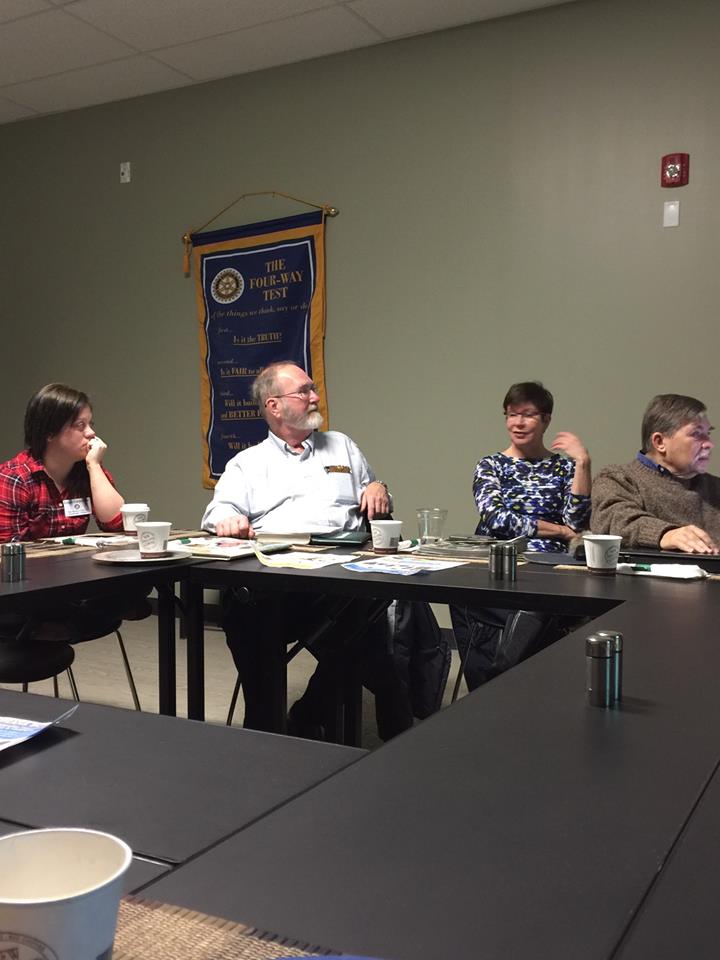Weekly Bulletin - February 16th Meeting
Posted by Rich Garcia on Mar 01, 2017

Our speaker was Patti Quigley, Executive Director of Razia's Ray of Hope Foundation
Guests:
- Patti Quigley, speaker
Announcements:
- Our club’s fifth anniversary birthday bash will be held the evening of February 23, at Nancy’s Airfield Café..
- The Rotary International president-elect will speak at PETS in Framingham on March 9.
- Our club’s food packing event will be March 18, at Nashoba Regional High School.
- Dueling Pianos will perform April 1 at Bull Run in Shirley, to benefit Habitat for Humanity’s project in Fitchburg.
- Acton/Boxborough Club is holding a Wine Tasting fundraising event on April 27. Half of the ticket revenue sold by our Club members benefits our Club treasury.
- April 28 we’re sponsoring the Reality Fair for students at NRHS.
- Habitat for Humanity is hosting a breakfast at 7:30 o n May 3; details to follow.
- The next Bolton Repair Café is scheduled for May 20; Ray is also working with the Sustainability Committee in Littleton.
- The deadline for applications to RYLA is March 1, with the event itself on June 23-25.Volunteers are needed.
- Looking far into the future, the date for our annual Brewfest IS August 12.
- The next meeting of Rotary Means Business will be at the Radisson Hotel & Suites in Chelmsford, on March 1.
Happy/sad fines
- Brian: happy to be here.
- Ron: sad that he’ll miss the club’s birthday party but happy that he and his family will be in Cancun.
- Howard: happy for the Patriots ‘ win; and happy to know that Leigh and his daughter both went to the same college, and both were in the same sorority.
- Carolyn: sad that their construction manager is leaving.
- Leigh: apologizes that she hasn’t been here since before Thanksgiving.
- Bob: will be spending time with his granddaughter in Killington.
- Ray: went to the Patriots parade and had a great time; and is happy that the snow is the kind that he can play in.
Program:
Our speaker was Patti Quigley, Executive Director of Razia's Ray of Hope Foundation. The Razia Jan Institute is the first women’s post-secondary vocational school in rural Afghanistan and scheduled to open in March 2017. At the Razia Jan Institute, two courses of study are offered: health services/midwifery, and office administration. Students graduate in two years with marketable, much-needed skills and the ability to work in schools, businesses, government, and health care — careers that are compatible with being a married, observant Afghan woman.
Razia Jan has been a Rotarian for decades. She has a business in Duxbury, lives in Wellesley, and has family in Los Angeles. When in the US, she spends a large amount of time visiting Rotary clubs, who have been instrumental in financially supporting the hope and then the reality of a school for girls in Afghanistan.
The school takes in 50 kindergartners each year. The first graduating class was last year, with seven graduates. Starting in 2018 they will graduate classes of 50 high school seniors so the school’s population is about 650. Families allow the girls to stay in school, something that doesn’t always happen elsewhere in Afghanistan. The retention rate is higher than elsewhere, as attested by the Ministry of Education. The school is private, although the girls pay no money.
But after graduation, what do the girls do? Some are engaged, some are married; but the girls want to have skills they could use working. From that came the idea of a post-secondary school with a midwifery program and medical clinic, plus computer skills and personal finance. Midwifery is important because of a need for safe delivery in an area where there is no hospital.
The elementary/secondary school is now about 10 years old and is beginning to attract attention from other funding organizations. A grant from the US embassy started the school, the global grant from Rotary will pay for a couple of years of salary and transportation expenses and medical equipment for the clinic.
A lot of their teachers come from Kabul, so a van transports them. The men in the village are generally very supportive, even of those who are married or engaged. Of the first year, all the graduates are continuing in the college; next year, half will take courses at university in the capital.
The village is off the main highway. It’s the kind of place you only go to if you need to. An outsider is known immediately and questioned, then often accompanied to make sure he gets to the place he asked for. As a result, wartime violence is rare. But everyone knows that it’s all around them and that it could happen at any time.
Razia’s efforts have been so successful because she’s worked within the community. The village elders meet at the school, discuss, make suggestions. And the Ministry of Education showcases this school to others as the way a school should be run.
